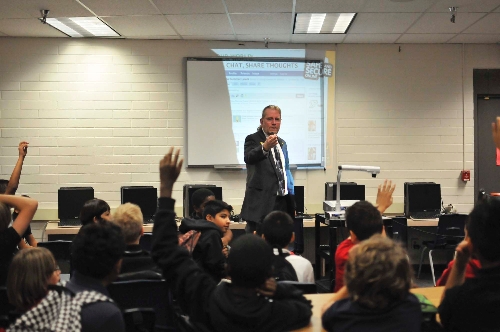Kids warned to watch for potential pitfalls of the social Web

Kids sometimes need reminding of the parental adage about strangers.
Gary Alu, an information technology security expert, reminds them over and over again.
"What have your parents told you since you were this tall?" he asked, lowering his hand near the ground.
"Don’t talk to strangers," a classroom of 11- and 12-year-old boys recited in unison.
Alu gave a presentation last month at Cashman Middle School, 4622 W. Desert Inn Road, to teach students how to protect themselves and their families while online. Alu has visited dozens of middle schools for the past few years to the present the program, which was created by the International Information Systems Security Certification Consortium, or (ISC)² .
Alu asked how many in the class had a Facebook account, and nearly every student raised his hand. He then pointed out that a minimum age of 13 is required for a Facebook account.
Alu asked students how many "friends" they have on Facebook —- 48 , one student said. About 120, said another student; another had 298 .
Alu warned the class about the dangers of having friends on Facebook or other social networking sites that you have not met in person.
Last month, a 26-year-old Henderson man, Scott Vernon, was sentenced to 14 years in federal prison for using MySpace to have sex with underage girls. Vernon posed as a teenager and would arrange meetings with girls in their teens and younger. Vernon chatted with hundreds of minor-age girls and met with about 20 of them before being caught.
Some online predators are interested in money instead, Alu said, calling it a "multibillion-dollar business" that has evolved because people, especially kids, do not protect sensitive information.
"Bad guys," or "Mr. Creepy," as Alu called them, patrol Facebook looking for posts such as "home alone" or "going to Disneyland with family for the weekend."
Such posts are invitations to have your house robbed, Alu said.
"You have to control your information," Alu said repeatedly throughout the presentation. "Mr. Creepy sits in front of his computer all day looking for ways to hurt you. That’s all he does."
Alu also informed students of the risks of giving out credit card information that is required to use Xbox and PlayS tation multiplayer networks. Alu told them he has seen many cases where parents are charged thousands of dollars because kids give out personal information on those networks.
The second half of Alu’s presentation dealt with cyberbullying, which is illegal, as he reminded the students. He cited the arrests of six middle school girls this year in Carson City who made threatening posts about a teacher on Facebook.
Alu said it is important to report bullying immediately to a teacher and that forwarding or copying a bullying message makes you a cyber bully.
Alu has given the same presentation to parents at several middle schools and said parents are usually "pretty surprised" by what they hear. "We need to keep the kids involved and get the parents involved," Alu said. "We want to get the parents more engaged in the situation."
Alu recommends always setting high online privacy settings on social networking sites. The best thing a parent can do to prevent a lot of bad activity, said Alu, is to keep computers in a public place in the home.
Passwords should be hard for us to type so that they are really hard for bad guys, Alu said. He recommends substituting characters in a simple phrase that only you would know. For example, "My dog is Rex" could be a password such as "mYd0g15r3X." A list of the most common (and worst) passwords is released every year by online technology companies. Google the complete list to check yours, but if your password is "password," "123456" or "qwerty," change it.
Jim Luckow and Sheila Acevedo are computer literacy teachers at Cashman and teach students about I nternet safety throughout the semester.
"It’s nice to get a perspective from an outside source," Acevedo said. "When you have somebody from the real world, (students) tend to listen more closely."
Two weeks after seeing the presentation, sixth-graders in Luckow’s and Acevedo’s first-period classes were polled about whether they had changed their online habits as a result of the presentation. Ten of 70 said they did.
Most of those said they increased their privacy settings on Facebook or other social networking sites. A few made their passwords more intricate. Seventh- and eighth-grade students were not polled.
Contact View education reporter Jeff Mosier at jmosier@viewnews.com or 224-5524.












